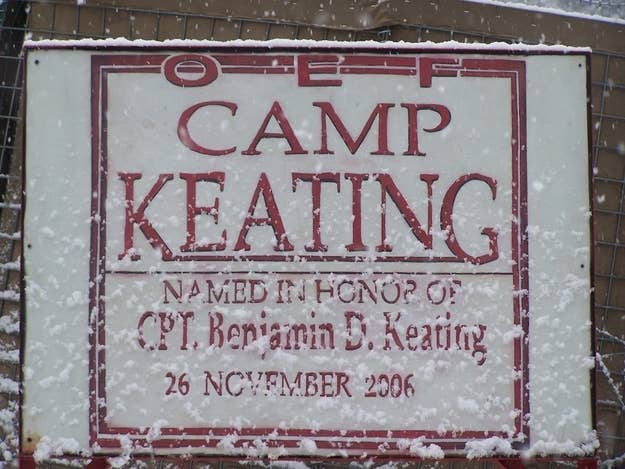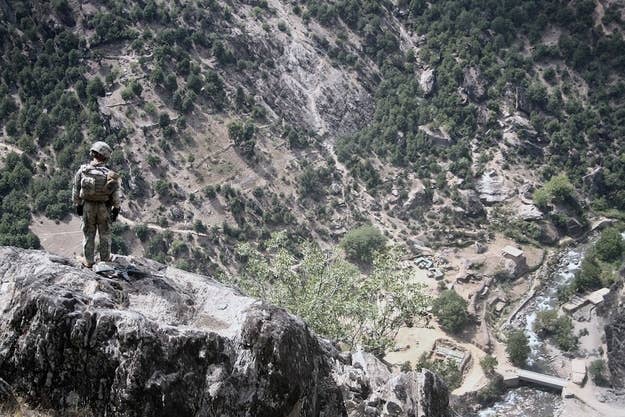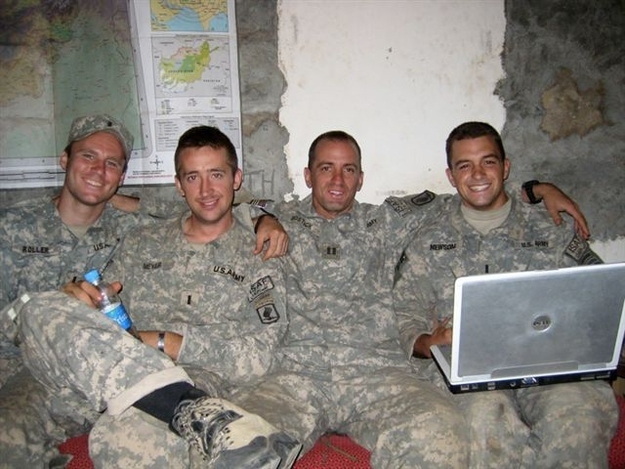
ABC News senior White House correspondent Jake Tapper released his third book last week, a story of a far-flung American combat outpost in the far reaches of northern Afghanistan. The Outpost describes how the soldiers of Combat Outpost Keating, far away from the nearest base and surrounded by insurgents, survived in rotten conditions while trying to reach out to the local community — but were nonetheless attacked by hundreds of local men who killed eight Americans and wounded 22 in October 2009.
Tapper spoke to BuzzFeed over email about The Outpost, Afghanistan, and his favorite war books.
How did you choose Combat Outpost Keating as the subject of the book?
My son was born on October 2, 2009. In the haze in the recovery room at Sibley Hospital, I caught a news report about an October 3rd attack on a vulnerable outpost in an obscure corner of Afghanistan. The story was just bizarre at first – the outpost had been put at the bottom of three steep mountains just 14 miles from the Pakistan border, and no one seemed to have any idea why the troops were put in such a dangerous place. And as I held my son, I learned about eight other sons taken from this earth.
In subsequent weeks and months I tried to find out more about the battle, the bravery of the troops, and about why Combat Outpost Keating had been put there. But there wasn’t much information that came out. So I started making calls, contacting soldiers who had been there.
Their tales were tragic and inspiring and cinematic; every one of the eight U.S. troops killed that day died while either fighting the enemy or trying to help a fellow soldier. The palm of courage. And frankly eye-opening. I’d been covering the war from the comfort of the North Lawn of the White House, but I realized there was a great deal I didn’t know or understand. That desire to learn more, to plug in holes in my own understanding of war, eventually became a book contract to tell the story of the outpost.
So I guess I didn’t choose Combat Outpost Keating; Combat Outpost Keating chose me.
How much time did you spend in Afghanistan in researching the book? What was it like?
I went to Afghanistan twice. Once very briefly with President Obama in 2010. And the other time in October/November 2011 when I was embedded with the 2/27 Infantry Wolfhounds at Forward Operating Base Bostick and with the All-American Dustoff Medevac Unit at Bagram. That was for just over a week.
It was exhilarating and terrifying. It’s easy to see why war reporters get addicted to it. Our Medevac got fired upon on a mission once; makes getting yelled at by an irate press secretary seem even more trifling.
Most of the reporting, however, was conducted in the U.S.: in Colorado or Georgia or Washington, D.C. And in this age of social media and global communications, it was much easier than it would have been even a decade before, with troops sending me Google earth coordinates to show me what a particular patch of road looked like, and even a Skype interview with one of the insurgents who attacked the outpost, conducted with the help of an interpreter/fixer.
What were the biggest mistakes that were made with regard to the outpost; who is most responsible for the position those men were put in?
The outpost was put in its dangerous location in 2006 because it needed to be near the road so troops could monitor the flow of insurgents on that path, and also because there weren’t enough helicopters in Afghanistan to be able to provide consistent re-supply to the camp; they needed to be able to use convoys.
That’s the first and ultimately the biggest mistake – the decision by those running the war in 2006 to not provide the troops there with everything they needed to win the war. All other mistakes flow from that one.
One of the most moving stories in the book for me was when the father of a dead soldier – a posthumous Medal of Honor winner – voices his anger for the president and Defense Secretary for not giving his boy the support he needed. It still haunts me and I know it haunts him even more.

Do you think you could have done more to tell the Afghans' side of the story? Part of the book describes the total destruction of the village of Urmul, which obviously wasn't a small thing for its residents.
Sure, but it would have been a different book. The goal of “The Outpost” is to describe what it is exactly that our troops do, what it’s like for them in war, what their sacrifices are, their successes, failures, tragedies and triumphs.
Have you kept in touch with any of the men or their families? How are they?
I keep in touch with dozens of them, and it’s one of the great benefits of this project that I now have all these new friends – troops, their families, mothers who have lost sons, wives who have lost husbands. Some of them are thriving. Some of them are still struggling with their losses and experiences. We had a book launch in Washington, DC, on November 10 and dozens of troops came. My mom was there – she’s a retired psychiatric nurse and used to work at the Veterans hospital in Philadelphia, dealing mainly with Vietnam veterans. She told me that many times during the event, she would notice troops twitching or their faces tightening up whenever Afghanistan came up in conversation. Some of these scars will never heal.
What do you think of the new commander of Afghanistan forces saying he supports a troop presence there past 2014?
It’s always been the plan that the U.S. would continue to have troops in Afghanistan long past this “exit” date, which is kind if misleading, as was Vice President Biden’s assertion that “we are leaving in 2014, period.” Not true. If you listen to the president and others, they talk about 2014 being the date when “combat troops” will leave—meaning conventional fighting forces. But the plan is to clearly have special forces troops there, and perhaps more.
When I was in Afghanistan, many leaders in the field told me they thought the Afghan National Army and other local security forces would be ok to stand on their own by 2014, but they had grave doubts about the ability of the Afghans to provide those forces with logistical support – fuel and supplies and Medevacs and the like. Well, one can’t put down an insurgency with forces that don’t have fuel and food and medical care. So I suspect there will be more that the U.S. provides in terms of support for the Afghans long after 2014.
One of the heroes in the book appears in 2007: Lieutenant Alex Newsom of Bulldog Troop, 1-91 Cav. Newsom was nicknamed Captain America – he’s this model-looking guy from Beverly Hills, a fitness addict – and he re-appears in the book at the end as a Special Forces soldier still running through the hills of Afghanistan, still convinced the U.S. can win this war. We’ll have a lot of Alex Newsoms in Afghanistan long after the war is “over” in 2014.
What does what happened with Keating say about the challenges (or failures?) of the counter-insurgency strategy in Afghanistan?
Counter-insurgency, winning over locals through development projects and by connecting them to the government so that they are separated from the enemy, is an intriguing strategy. The problems arise because locals know the enemy will be there in five years; they’re not sure about the U.S. or the Afghan government. The book details many successes that troops had with Counter-insurgency, especially from 2007-2008 under the leadership of Lt. Col. Chris Kolenda, Captain Joey Hutto and 1-91 Cav. But ultimately Kolenda and Hutto were rotated out of the country when his tour was up, and though the next commander of the outpost, Captain Rob Yllescas, had great relationships with the locals, he was targeted for assassination and the cooperative spirit in that area quickly deteriorated. Ultimately hundreds of local men took part in the attack on Combat Outpost Keating.

Do you think the Petraeus scandal will affect how we judge his record in Iraq and Afghanistan?
Ultimately the success of the wars will be judged unto themselves, free of the personal scandals of the various generals who have served there. General Stanley McChrystal is a big character in third part of The Outpost, with Petraeus as the celebrity/warrior/poet/military leader that he and his aides seek to emulate – though they fall short, and McChrystal delays requests from subordinate commanders to close the vulnerable Combat Outpost Keating, with deadly results.
When I think about Petraeus these days, I think about this passage from The Outpost:
Up the mountain at Observation Post Warheit, Dave Roller and the men of 1st Platoon were getting used to a lifestyle even more spartan than the one down the hill at Combat Outpost Keating. Hygiene had become a relative term: six weeks into their stay at Warheit, Roller had yet to use any shampoo and was still on his first bar of soap. The troops bathed in a mountain stream; that part was kind of fun. Roller hadn’t worn deodorant in three months, and he rotated his socks, shirts, and uniforms on a monthly basis. The platoon had run out of forks and spoons so many times that it was common to see soldiers sticking any spoons they found into their pockets for later use, or licking forks “clean” so other soldiers could use them. There were no longer any women permanently stationed at either Observation Post Warheit or Combat Outpost Keating… Since Afghan women universally hid from U.S. soldiers, the 1st Platoon troops literally hadn’t seen a woman in months.. It was an odd sensation for the Americans — as if men were the only ones left on the planet. Whenever this one particular female Apache pilot flew in the area, soldiers would crowd around the radio just to hear her voice. They’d never seen her, but they were all convinced she was gorgeous.
It’s difficult to reconcile that harsh reality with Petraeus bringing Paula Broadwell with him to Afghanistan.
Did it suck to miss the president's first briefing in months while doing promotion for the book?
I hated it. I had so many questions to ask. But ultimately I’ll get another shot to ask him questions, while this book launches only once.
What are your other favorite war books?
Ten greats, in no particular order: The Things They Carried (O’Brien), Dispatches (Herr), The Long Road Home (Raddatz), War (Junger), Black Hawk Down (Bowden), Where Men Win Glory (Krakauer), We Were Soldiers Once…And Young (Moore and Galloway), Band of Brothers (Ambrose), The Forever War (Filkins), and Flyboys (Bradley). But there are so many other great ones….On my night table right now are two personal war memoirs from veterans/authors with whom I participated in a panel at the Miami Book Fair, Benjamin Busch’s Dust to Dust and Brian Caster’s The Long Walk.
